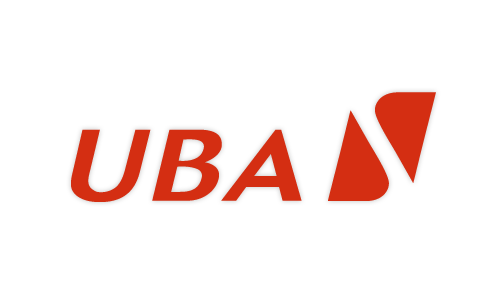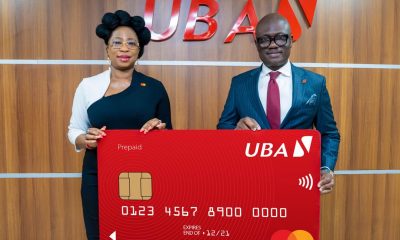Business
UBA Delights Shareholders; Distributes N27.2bn in Dividends

The shareholders of the pan-African financial institution, the United Bank for Africa (UBA) Plc applauded the Board, Management and Staff at the 55th Annual General Meeting of the Bank, held in Lagos on Friday April, 7, 2017. UBA shareholders approved the payment of N19.9 billion as final dividend for the financial year ended 31st December 2016, in addition to N7.3 billion interim dividend paid after the audit of its 2016 Half Year Results.
The shareholders, who unanimously approved the N0.55/share final dividend on every ordinary share of N0.50 each were particularly impressed by the new Group Managing Director/CEO, Mr. Kennedy Uzoka, who delivered unprecedented results to shareholders at his inaugural AGM. UBA had earlier paid an interim dividend of N0.20/share to shareholders, bringing the total dividend for the 2016 financial year to N0.75kobo, an impressive 25% growth over the total dividend of N0.60/share paid for the 2015 financial year. Furthermore, the total dividend of N0.75/share translates to an unparalleled yield of 14.3% when put in the perspective of UBA’s share price of N5.26 on the Nigerian Stock Exchange, as at the close of market on Friday, April 07, 2017.
The Shareholders were excited at the sterling performance of the Group, an impressive 22% year-on-year growth in gross earnings and an outstanding 32% year-on-year growth in profit to N91 billion, in what analysts described as an attestation to UBA’s resilience and enhanced productivity.
Worthy of note to the shareholders is the contribution from the Group’s African subsidiaries, emphasizing its earnings diversification, across geographies which reduces the Group’s vulnerability to macroeconomic pressures in any single market. The Group’s ex-Nigeria subsidiaries contributed 32% of the Group’s profit in 2016, compared to a quarter of profit contribution in the 2015 financial year.
Notwithstanding the challenging operating environment, the Group recorded an impressive 22% growth in gross earnings to N384 billion in 2016, from N315 billion in the 2015 financial year, illustrating the Bank’s resilience and tenacity to generate earnings even in periods of economic slowdown.
The Group further achieved a significant 32 percent growth in profit before tax to N91 billion, compared to N68 billion profit recorded over the same period of 2015. UBA’s profit after tax grew by 22 percent to N72 billion, from N60 billion recorded the previous year.
President of the Association for the Advancement of the Rights of Nigerian Shareholders, Alhaji Farouk Umar, said at the AGM, “It is obvious from the faces of shareholders that all of us are happy with the performance of the bank. We did not expect anything less because we know that that our chairman is an achiever not only locally but also internationally. We have seen the African expansion and its contribution to our earnings and I believe this is also commendable.”
The Group Chairman, UBA Plc, Mr. Tony Elumelu, gave credit to the chairpersons of UBA subsidiary Boards across Africa saying ‘these hard working men and women, who chair the Boards across our businesses in Africa, have helped contribute a third of the overall profit of the Group. I believe they deserve commendation. They are strengthening UBA brand across Africa, in line with our aspiration.” He was particularly pleased with the Bank’s new CEO, Kennedy Uzoka. ‘At the Board level, we are extremely pleased by the financial performance that Kennedy and his team delivered in 2016. Kennedy and his team prioritize the Customer and they are diligently executing the Customer First project, which the Board believes will sustainably enhance the performance of the Group’ said Elumelu.
“Our results show the tenacity and enterprise of our Management team and Staff. More importantly is our ability to proactively meet customers’ need. I am pleased that UBA maintains some of the best prudential ratios in the industry, as our capital adequacy ratio of 20% and 39% liquidity ratio are well above the 15% and 30% regulatory requirement respectively. We will be prudent in lending to critical growth sectors of the African economies, as we remain upbeat on the huge banking opportunities in Africa’, he added.
He also used the occasion to commend the Federal Government of Nigeria and Central Bank of Nigeria on their concerted policy actions aimed at reflating the Nigerian economy. ‘I will like to encourage them to continue along this path, which I believe willstimulate the country’s economy in the shortest possible time’.
The Group CEO, Kennedy Uzoka assured the shareholders of a better 2017. “As we further our Customer First Philosophy, we are approaching 2017 with stronger optimism, especially as the outlook remains positive in most of our markets. We are not unaware of the macro economic challenges, competition and constantly changing customer preferences. Rather, we believe we are well equipped to win in the market. We will further sweat our unique Pan- African platform to improve productivity, extract efficiency gains and grow our share of customers’ wallet across all business lines and markets. We will continue to build on our strong governance culture, zero-tolerance for infractions and transparency in furthering our frontiers of leadership in the African market.
United Bank for Africa Plc (UBA) is a leading pan-African financial services group with presence in 19 African countries, as well as the United Kingdom, the United States of America and France.
UBA was incorporated in Nigeria as a limited liability company after taking over the assets of the British and French Bank Limited who had been operating in Nigeria since 1949. The United Bank for Africa merged with Standard Trust Bank in 2005 and from a single country operation founded in 1949 in Nigeria – Africa’s largest economy – UBA has become one of the top providers of banking and other financial services on the African continent. The bank provides services to about 14 million customers globally, through one of the most diverse service channels in sub-Saharan Africa with over 1,000 branches and customer touch points and a robust online and mobile banking platform.
UBA was the first Nigerian bank to make an Initial Public Offering (IPO), following its listing on the NSE in1970. It was also the first Nigerian bank to issue Global Depository Receipts (GDRs). The shares of UBA are publicly traded on the Nigerian Stock Exchange (NSE) and the bank has a well-diversified shareholder base which includes foreign and local institutional investors, as well as individual shareholders.
Business
Nigeria’s Inflation Drops to 15.10% as NBS Reports Deflationary Trend

Nigeria’s headline inflation rate declined to 15.10 per cent in January 2026, marking a significant drop from 27.61 per cent recorded in January 2025, according to the latest Consumer Price Index (CPI) report released by the National Bureau of Statistics.
The report also showed that month-on-month inflation recorded a deflationary trend of –2.88 per cent, representing a 3.42 percentage-point decrease compared to December 2025. Analysts say the development signals easing price pressures across key sectors of the economy.
Food inflation stood at 8.89 per cent year-on-year, down from 29.63 per cent in January 2025. On a month-on-month basis, food prices declined by 6.02 per cent, reflecting lower costs in several staple commodities.
The data suggests a sustained downward trajectory in inflation over the past 12 months, pointing to improving macroeconomic stability.
The administration of President Bola Ahmed Tinubu has consistently attributed recent economic adjustments to ongoing fiscal and monetary reforms aimed at stabilising prices, boosting agricultural output, and strengthening domestic supply chains.
Economic analysts note that while the latest figures indicate progress, sustaining the downward trend will depend on continued policy discipline, exchange rate stability, and improvements in food production and distribution.
The January report provides one of the clearest indications yet that inflationary pressures, which surged in early 2025, may be moderating.
Bank
Alpha Morgan to Host 19th Economic Review Webinar

Alpha Morgan to Host 19th Economic Review Webinar
In an economy shaped by constant shifts, the edge often belongs to those with the right information.
On Wednesday, February 25, 2026, Alpha Morgan Bank will host the 19th edition of its Economic Review Webinar, a high-level thought leadership session designed to equip businesses, investors, and individuals with timely financial and economic insight.
The session, which will hold live on Zoom at 10:00am WAT and will feature economist Bismarck Rewane, who will examine the key signals influencing Nigeria’s economic direction in 2026, including policy trends, market movements, and global developments shaping the local landscape.
With a consistent track record of delivering clarity in uncertain times, the Alpha Morgan Economic Review continues to provide practical context for decision-making in a dynamic environment.
Registration for the 19th Alpha Morgan Economic Review is free and can be completed via https://bit.ly/registeramerseries19
It is a bi-monthly platform that is open to the public and is held virtually.
Visit www.alphamorganbank to know more.
Business
GTBank Launches Quick Airtime Loan at 2.95%

GTBank Launches Quick Airtime Loan at 2.95%
Guaranty Trust Bank Ltd (GTBank), the flagship banking franchise of GTCO Plc, Africa’s leading financial services group, today announced the launch of Quick Airtime Loan, an innovative digital solution that gives customers instant access to airtime when they run out of call credit and have limited funds in their bank accounts, ensuring customers can stay connected when it matters most.
In today’s always-on world, running out of airtime is more than a minor inconvenience. It can mean missed opportunities, disrupted plans, and lost connections, often at the very moment when funds are tight, and options are limited. Quick Airtime Loan was created to solve this problem, offering customers instant access to airtime on credit, directly from their bank. With Quick Airtime Loan, eligible GTBank customers can access from ₦100 and up to ₦10,000 by dialing *737*90#. Available across all major mobile networks in Nigeria, the service will soon expand to include data loans, further strengthening its proposition as a reliable on-demand platform.
For years, the airtime credit market has been dominated by Telcos, where charges for this service are at 15%. GTBank is now changing the narrative by offering a customer-centric, bank-led digital alternative priced at 2.95%. Built on transparency, convenience and affordability, Quick Airtime Loan has the potential to broaden access to airtime, deliver meaningful cost savings for millions of Nigerians, and redefine how financial services show up in everyday life, not just in banking moments.
Commenting on the product launch, Miriam Olusanya, Managing Director of Guaranty Trust Bank Ltd, said: “Quick Airtime Loan reflects GTBank’s continued focus on delivering digital solutions that are relevant, accessible, and built around real customer needs. The solution underscores the power of a connected financial ecosystem, combining GTBank’s digital reach and lending expertise with the capabilities of HabariPay to deliver a smooth, end-to-end experience. By leveraging unique strengths across the Group, we are able to accelerate innovation, strengthen execution, and deliver a more integrated customer experience across all our service channels.”
Importantly, Quick Airtime Loan highlights GTCO’s evolution as a fully diversified financial services group. Leveraging HabariPay’s Squad, the solution reinforces the Group’s ecosystem proposition by bringing together banking, payment technology, and digital channels to deliver intuitive, one-stop experiences for customers.
With this new product launch, Guaranty Trust Bank is extending its legacy of pioneering digital-first solutions that have redefined customer access to financial services across the industry, building on the proven strength of its widely adopted QuickCredit offering and the convenience of the Bank’s iconic *737# USSD Banking platform.
About Guaranty Trust Bank
Guaranty Trust Bank (GTBank) is the flagship banking franchise of GTCO Plc, a leading financial services group with a strong presence across Africa and the United Kingdom. The Bank is widely recognized for its leadership in digital banking, customer experience, and innovative financial solutions that deliver value to individuals, businesses, and communities.
About HabariPay
HabariPay is the payments fintech subsidiary of GTCO Plc, focused on enabling fast, secure, and accessible digital payments for individuals and businesses. By integrating payments and digital technology, HabariPay supports innovative services that make everyday financial interactions simpler and more seamless.
Enquiries:
GTCO
Group Corporate Communication
[email protected]
+234-1-2715227
www.gtcoplc.com
-

 celebrity radar - gossips6 months ago
celebrity radar - gossips6 months agoWhy Babangida’s Hilltop Home Became Nigeria’s Political “Mecca”
-

 society6 months ago
society6 months agoPower is a Loan, Not a Possession: The Sacred Duty of Planting People
-

 society5 months ago
society5 months agoReligion: Africa’s Oldest Weapon of Enslavement and the Forgotten Truth
-

 news6 months ago
news6 months agoTHE APPOINTMENT OF WASIU AYINDE BY THE FEDERAL GOVERNMENT AS AN AMBASSADOR SOUNDS EMBARRASSING











You must be logged in to post a comment Login